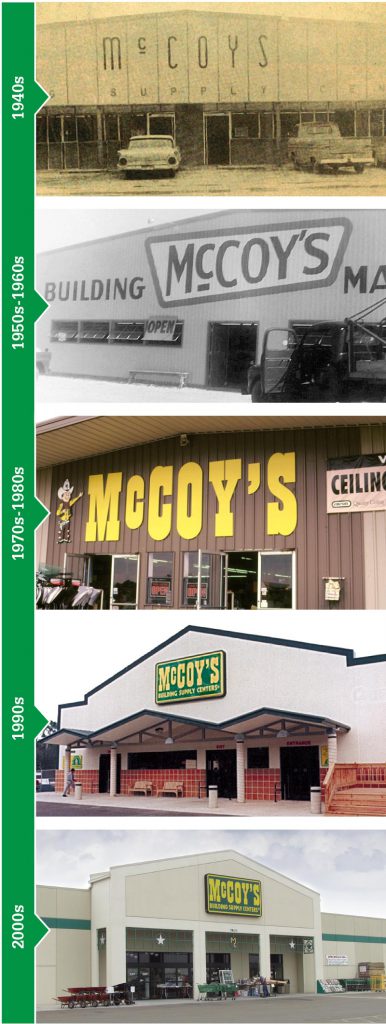To view a PDF of this story, click here.
McCoy’s Strategy for Succeeding Through the Depression, the Recession and Beyond
Nearly a century has passed since McCoy’s Building Supply first opened its doors. During this time, the Texas-based, family-owned business has seen success and struggle from the Great Depression to the latest recession. Over the past decade or more, the company has focused on maintaining its current success well into the next 90-year streak by investing in its people.

“We’ve been planning very carefully and strategically for the future of McCoy’s,” co-owner Meagan McCoy Jones says.
The company currently employs about 2,300 people across 86 retail stores and two millworks facilities in five states; its headquarters are in San Marcos, Texas. Training has been a priority at both the retail and executive levels. The company’s training and recognition programs are built on its “Business as UnUsual” philosophy, which celebrates hard work but also appreciates the lives people lead outside work.
A group of McCoy’s staff and business consultants developed a companywide retail training program that focuses on developing relational skills, team building and customer service, among other necessary traits retail employees need to be successful.
Within the last year, McCoy’s also developed a comprehensive 18-month retail management training program. “In essence, we documented everything you need to know at the basic level in order to run a McCoy’s store,” Jones says.
The company has what Jones calls “really intense mentorship programs” to develop current employees into leadership positions. Manager trainees have several mentors during training, including their store manager and store associates and at least one other manager in their region.
A few years ago, many of the people entering the management development program were hired from outside McCoy’s, Jones says. Today, more of the management development candidates are tenured McCoy’s team members wanting to contribute more, she says.
“Once you’ve mentored a couple people, I think your confidence appropriately grows to say, ‘You know what, I think I could do that,’” Jones says.
McCoy’s values its executive training process as well, especially in consideration of transitioning the company’s success to a new generation of leadership.
Making Succession Planning a Joy
McCoy’s has had the financial stability in recent years to fill executive leadership positions before needs become critical, allowing the company more time to develop employees into greater levels of responsibility.
Executives evaluate any potential holes at the executive and director levels, particularly for positions that don’t have any obvious successors within the company.
“We are carefully thinking about what kind of people and skillsets we need and could benefit from,” she says. “When you’re not in a hurry, you can really find the right person.”
Succession planning can be challenging and fraught with difficult conversation for some retailers, but it doesn’t have to be that way, Jones says.
“Sometimes succession planning is talked about like ‘you’ve got to find your replacement’ and that may be partially true, but that’s not the whole story,” she says. “We are adding value to the lives of other people so they can continue on what we started and make it even better. There’s a lot of joy in that.”
Allowing time for leadership development is crucial to staffers’ success once employees reach their intended positions within the company, Jones says. Executives are trained using the same Business as UnUsual philosophy as retail trainees, but they also receive training in fundamental business skills, which vary depending on the person’s role.
“New executives have time to prove they’re capable of what we think they are, and at the point that they’re promoted to a more senior level, they will have been in the company for five years or 10 years,” she says. “This patient approach to our next generation of leadership is what has allowed us to make it as long as we have.”
Tenure is highly valued throughout McCoy’s. The average tenure in McCoy’s retail stores is eight years, and in the corporate headquarters, it’s more than 12 years, says Jones. The company has created a top-500 list of its most tenured employees called the Fab 500. Currently, the Fab 500 employee with the least tenure still has a little more than 11 years of service with the company.
Sustaining a Legacy
The extensive list of long-tenured employees at McCoy’s is second only to the tenure of the company itself.
 “I’m a fourth-generation owner. We know we are breaking a lot of odds to get to this place,” Jones says. She currently serves as executive vice president and chief operating officer, and she co-owns McCoy’s Building Supply with her immediate family. Her father, Brian, is the company’s current CEO.
“I’m a fourth-generation owner. We know we are breaking a lot of odds to get to this place,” Jones says. She currently serves as executive vice president and chief operating officer, and she co-owns McCoy’s Building Supply with her immediate family. Her father, Brian, is the company’s current CEO.
Jones’s great-grandfather Frank McCoy started McCoy’s Roofing Company in Galveston, Texas, in 1927. Her grandfather Emmett took over the store when he returned from World War II, adding building supplies to the product mix and establishing McCoy Supply Company.
In September 1961, a massive hurricane and dozens of tornadoes hit the Texas Gulf Coast. The combination of disasters caused millions of dollars of damage. McCoy Supply Company helped Galveston and the surrounding areas rebuild over the next year, but retained its pre-disaster prices.
“In the aftermath of the disasters, Emmett was insistent on not raising prices on the supplies people needed to rebuild,” Jones says. “That practice is a part of McCoy’s legacy in treating customers fairly.”
Following the rebuilding efforts, Emmett expanded the business into a second location in Texas City, Texas. He discontinued the roofing business in 1964 and developed what is now McCoy’s Building Supply. Over the next several decades, the company expanded into dozens more locations throughout the Gulf Coast region. Emmett ran the business until he retired in 1997, and his sons Brian and Mike McCoy were co-CEOs until Mike retired in 2001.
When they took over in the late 1990s, Brian and Mike recognized the need to establish a comprehensive strategy to ensure McCoy’s could compete against big-box stores in the professional market.
“At the time, we didn’t offer credit or other services typical of a lumberyard that serves builders and contractors, so we weren’t completely a pro lumberyard or completely a hardware retailer,” Jones says.
As part of its modernization strategy in the early 2000s, McCoy’s implemented credit and delivery services and grew its professional sector customer base. The company now employs outside sales representatives to manage professional sector sales. “We earn the business of our professional customers because we can price competitively, and our services are more robust and efficient than big-box stores,” says Jones.
Professional contractors make up about one-third of McCoy’s varied customer base. The other two-thirds of their customer base is split evenly between repair and farm and ranch tradespeople and DIY retail customers. With this model, the company benefits from being able to focus on different sectors when new home construction is slow or if retail isn’t strong in a particular market.
But the focus has always been on ensuring builders of all kinds have access to quality products. McCoy’s developed a purpose statement to hone in on this focus. The new mission is simple: “To make life easier and more fulfilling for those who build.”
Customers are only part of what contributes to McCoy’s success. The people who work for McCoy’s and commit to the mission every day are crucial.
Taking Care of Employees
As many independent businesses did, McCoy’s had to cut jobs during the recent recession. But the company has seen a significant rebound over the past several years. Since 2009, McCoy’s has added 600 jobs.

“For all of us who are running businesses in this industry, job creation and being an employer is something we should be really proud of, no matter how many people you’re putting to work,” Jones says. “Ours is an industry that I have a lot of love and admiration for in large part because the people are hardworking and kind, and they care about the community and the work that they do.”
McCoy’s Building Supply values the time and care its employees give to the business, and the company makes every effort to ensure time is used wisely. “We focus on how we can be good stewards of the time and resources we’ve been given, the people who have chosen to work with us and for us and the environment and communities we serve in,” Jones says. “We are asking ourselves, if we care about people and the markets we serve, how do we keep making decisions in light of that?”
McCoy’s encourages store managers to engage with their communities and initiate philanthropic events that will resonate with their markets, such as blood drives or animal adoption drives. “Our hope is that when you walk into a McCoy’s store, it feels like a local store,” Jones says. “That tone is really set by the manager and their team.”
In support of valuing employees’ time, all McCoy’s stores are closed on Sundays. Changing that has never been a topic of discussion, Jones says. “This was really my grandfather’s decision years and years ago — that our team members needed a reliable day off to be with their families, to worship if they choose and to recharge. And we carry that forward,” she says.
Jones has had the opportunity to work in a wide variety of roles in the company since she was a child, and from those experiences she puts great stock in the people of McCoy’s.
“I’ve had some great bosses here,” she says. “With each job I’ve had, there have been people who have taken it upon themselves to help me improve. At each hurdle, my gratitude and passion for the work grew. That’s as much, if not more, a credit to the people I’ve gotten to learn from.”
 Hardware Retailing The Industry's Source for Insights and Information
Hardware Retailing The Industry's Source for Insights and Information








